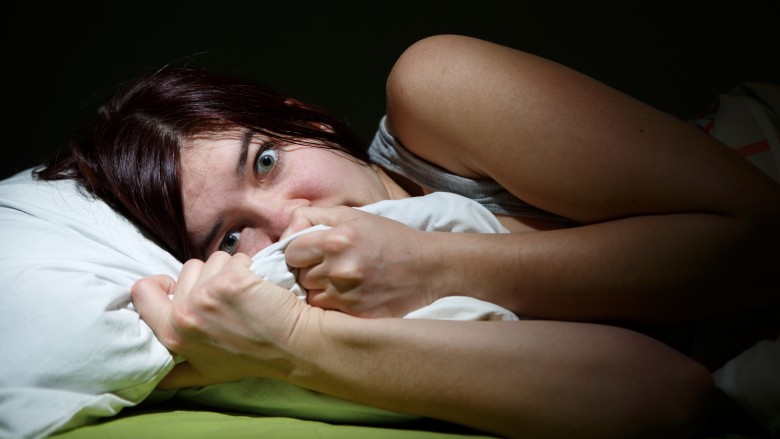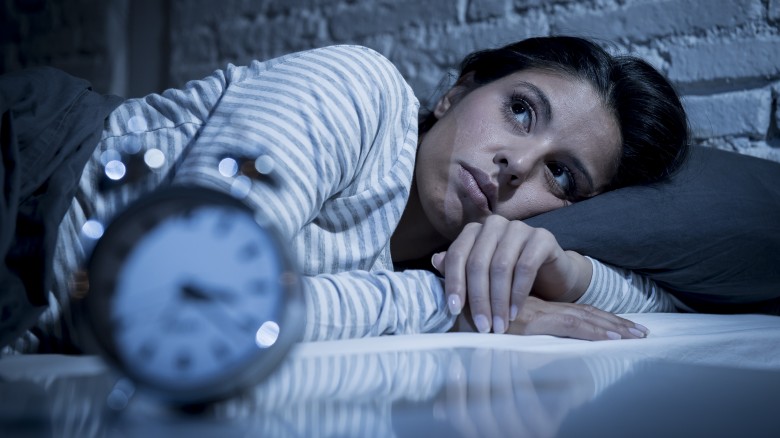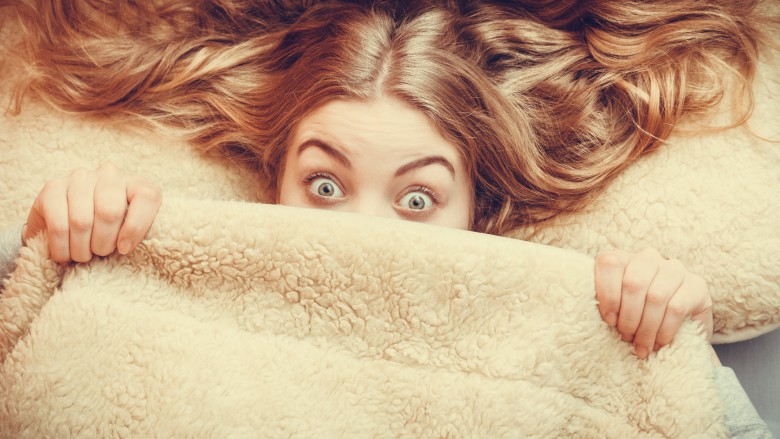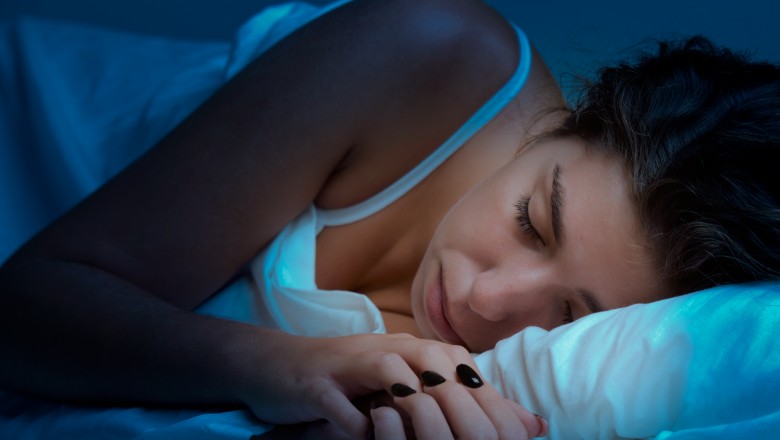What Your Dreams Reveal About Your Health
Have you ever wondered why we dream? Rosalind Cartwright, Ph.D., told the National Sleep Foundation that dreams are the way the brain "incorporates memories, solves problems and deals with emotions. In this way, dreams are essential for our emotional health."
While dreaming is an important and necessary physical function to help with our memory and mental health, dreams can also indicate other health issues that might need our attention. From nightmares to the frequency of dreams, we can learn a lot from our nocturnal adventures. Here are a few dreaming issues that may indicate something more serious is going on with your health.
Nightmares can be a warning sign
There's nothing worse than waking from a nightmare in a cold sweat, heart pounding and nerves rattled. While a nightmare from time to time is generally not anything to worry about, frequent nightmares can indicate something more serious is going on with your health. One study found that nightmares can be linked to heart disease, with an irregular heartbeat increasing your risk of nightmares even more. This is because heart disease can decrease the amount of oxygen reaching your brain, which can trigger a nightmare.
Another possible cause of nightmares is sleep apnea, a chronic condition that occurs when you have pauses in your breathing or shallow breaths during sleep. These pauses can really mess with your REM sleep due to lack of oxygen. "Patients have had terrifying dreams of drowning or suffocation," William Kohler, MD, medical director of the Florida Sleep Institute, told the Huffington Post. "In reality, their airway is blocked off."
You might want to look into some of these possible causes for your nightmares, if you suffer from them. No one wants to continue having bad dreams.
Dream frequency may point to a number of conditions
Most people have about four to six dreams every night, but don't remember near that many. Interestingly, we're more likely to remember dreams if we wake up before the dream is over, or soon after it. Mood disorders like anxiety and depression might be a cause of increased dream frequency. These disorders can cause you to wake more frequently during REM sleep, so you remember more of them. If you are concerned, you might try keeping a journal by your bed and noting the frequency of your dreams. Although you might not think you are suffering from a mood disorder, the frequency of your dreams might say otherwise.
Other causes of more frequent dreams can include being too hot or cold during the night, chronic pain or coming off antidepressants. Even your hormones can have an impact on the number of dreams you have and remember.
Vivid dreams or bizarre dreams that stay with you
Vivid dreams may arise for a variety of reasons. They may indicate you are suffering from certain medical conditions, which might include neurodegenerative disorders like Parkinson's disease. There are other, less frightening reasons for your weird dreams as well, so don't jump to conclusions too quickly.
This may come as a surprise to you, but particularly bizarre or memorable dreams might also indicate a possible infection. "Any infection increases the amount of slow-wave sleep we have, however, this delays the starting point of when we enter dreaming sleep, so dreaming sleep starts late, and can erupt into consciousness. This leads to vivid dreams and strange hallucinations," Dr. Patrick McNamara, a neurologist from Boston University Medical School, told the International Business Times.
Alcohol can also prompt vivid and memorable dreams. This is because the effects of alcohol wear off toward morning, affecting your brain chemicals and triggering bizarre and sometimes scary dreams.
Like alcohol, medications like antidepressants can also trigger vivid dreams, said Dr Patrick McNamara of the Boston University Medical School. "They've been shown to make REM bursts more intense in the people who take them," says Deirdre Barrett, Ph.D., assistant clinical professor of psychiatry at Harvard Medical School in Boston and author of The Committee of Sleep. "And most of those people seem to have more nightmares as a side effect." If your medications are interfering with your sleep and your dreams, discuss them with your doctor. It might be time to switch medications.
Dreams that wake you early
I tend to be an early bird, waking up most days before the alarm goes off. However, dreams that wake you early might be a warning sign for a mood disorder like anxiety or depression, says Professor Jim Horne, a sleep expert from Loughborough University. Doctors have noted that people with depression or anxiety enter REM sleep much earlier during the night, so they have their dreams earlier in the night and wake up early.
Horne says another possible reason for waking from a dream earlier than usual can be a result of acid reflux — better known as heartburn — which may develop after consuming a large or fatty meal the night before. If you suffer from the latter, you might want to consider having a lighter meal in the evening to a assure a good night's sleep, with pleasant dreams.
Dreams of being attacked
Personally, I can't recall ever having a dream of being attacked, and I don't think I want to begin having them. Like other nightmares, attacking dreams might indicate a neurodegenerative disorder like Alzheimer's or Parkinson's.
On a psychological level, dreams of being attacked can also indicate a feeling of having a loss of control in some aspect of our lives.
"Even if you feel you are in complete control of your life, you may still have an attacking dream, because deep down, you could be waging a war to stay in control, and fear what would happen if you lost control," says Amy Campion of Dream Well. "Attacking dreams are not usually about wanting to hurt ourselves or others, but can be about our own unresolved internal conflict." While these dreams are unpleasant, they might help you resolve those fears or the lack of control you might be feeling.
Erotic dreams might indicate increased creativity
It's time to move on to dreams that are more pleasant. Here's a fun one that came as a surprise to me. Scientists are finding that dreams of a sexual nature may indicate a surge in creativity. Interestingly, while people of all ages have erotic dreams, they tend to occur more frequently as we age, psychologist Ian Wallace told The Daily Mail.
"Many of my clients in their 60s and 70s report having these," he said. "Surprisingly, they don't actually represent anything about their sex life, but are connected to increased levels of creativity." He notes that as people get older and enter retirement, they often take up new hobbies of a creative nature, which can explain the increase in frequency of sexual dreams.
Are you like me and think this might be something to look forward to?
Bad dreams can result from a variety of triggers
Not all dreams indicate a problem with your health, so don't jump to conclusions if you have nightmares or bizarre dreams. There are certain triggers that might induce a particular type of dream, according to Woman's Day. Smells, sounds, even what you watched on television before going to bed can affect your dreams, so watching a scary movie before sleeping might trigger a similar scenario in your dreamscape.
Even vitamins can affect our dreams, says Deirdre Barrett, Ph.D. "B6 is the co-factor our body uses to turn some of the amino acids we eat into the neurotransmitters that affect our dreaming," she noted.
When you wake from a particularly scary dream, think about the day or night before and see if there is a link to your dream. You might also consider having a gander at the vitamins and supplements you take to see if there is a history of the supplement and strange dreams.
Healthy living can help you have sweet dreams
One way you can assure you have restful sleep with pleasant dreams is to take control of your health (and your dreams) by adopting a healthy lifestyle. Exercise, eating well and minimizing your risk of developing diseases that mess with your dreams is a good start.
You might also try having a healthy snack before bed like a banana and a glass of skim milk, which contains tryptophan, an amino acid that help makes people drowsy and sleep more soundly. By incorporating these good, healthy habits, you are more likely to wake from a night of sweet dreams.









